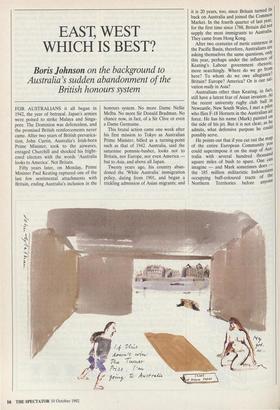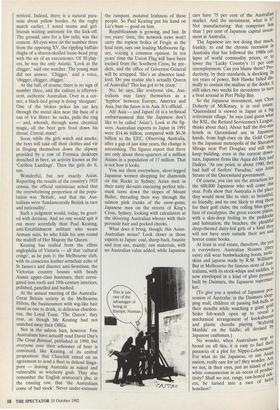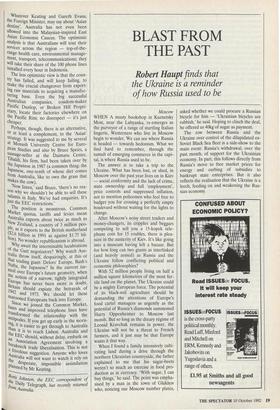EAST, WEST WHICH IS BEST?
Boris Johnson on the background to
Australia's sudden abandonment of the British honours system
FOR AUSTRALIANS it all began in 1942, the year of betrayal. Japan's armies were poised to strike Malaya and Singa- pore. The Dominion was defenceless, and the promised British reinforcements never came. After two years of British prevarica- tion, John Curtin, Australia's Irish-born Prime Minister, took to the airwaves, enraged Churchill and shocked his fright- ened electors with the words 'Australia looks to America'. Not Britain.
Fifty years later, on Monday, Prime Minister Paul Keating ruptured one of the last few sentimental attachments with Britain, ending Australia's inclusion in the honours system. No more Dame Nellie Melba. No more Sir Donald Bradman. No chance now, in fact, of a Sir Clive or even a Dame Germaine.
This brutal action came one week after his first mission to Tokyo as Australian Prime Minister, billed as a turning-point such as that of 1942. Australia, said the saturnine pommie-basher, looks not to Britain, nor Europe, nor even America but to Asia, and above all Japan.
Twenty years ago, his country aban- doned the 'White Australia' immigration policy, dating from 1901, and began a trickling admission of Asian migrants; and it is 20 years, too, since Britain turned its back on Australia and joined the Common Market. In the fourth quarter of last year for the first time since 1788, Britain did not supply the most immigrants to Australia. They came from Hong Kong.
After two centuries of metic existence in the Pacific Basin, therefore, Australians are asking themselves the same questions, only this year, perhaps under the influence of Keating's Labour government rhetoric, more searchingly. Where do we go from here? To whom do we owe allegiance? Britain? Europe? America? Or is our sal- vation really in Asia?
Australians other than Keating,
in fact, still have a latent fear of Asian invasion. At the recent university rugby club ball in Newcastle, New South Wales, I met a pilot who flies F-18 Hornets in the Australian air force. He has his name (Mark) painted on the side of his jet. But it is not clear, as he admits, what defensive purpose he could possibly serve. He points out that if you cut out the map of the entire European Community you could superimpose it on the map of Aus- tralia with several hundred thousand square miles of bush to spare. One can imagine — and Mark sometimes does — the 185 million militaristic Indonesians occupying buff-coloured tracts of the Northern Territories before anyone noticed. Indeed, there is a natural para- noia about yellow hordes. At the rugby match earlier, I noted mums and girl- friends waiting anxiously for the kick-off. The ground, save for a few tufts, was like cement. All eyes were on the number three from the opposing XV, the rippling buffalo thighs of a shaven-skulled loose-head prop with the air of an executioner. Of 30 play- ers, he was the only Asiatic. 'Look at the chigger,' said one watcher. The young man did not answer. 'Chigger,' said a voice, 'chigger, chigger, chigger.'
At the ball, of course, there is no sign of number three, and the culture is efferves- cent, authentic Australian. Over in a cor- ner, a black-tied group is doing 'shotguns'. One of the blokes pokes his car key through the metal skin near the base of a can of Vic Bitter: he sucks, pulls the ring — and, whoosh, through some chemical magic, all the beer gets fired down his throat. Unreal, mate!
Soon, while the girls watch and smoke, the boys will take off their clothes and vie in flinging themselves down the slipway provided by a row of Formica desktops drenched in beer, an activity known as the `Caribou Landings'. Then the girls do it, too.
Wonderful, but not exactly Asian. Reporting the results of the country's 1933 census, the official statistician noted that the overwhelming proportion of the popu- lation was 'British', and that the Aus- tralians were 'fundamentally British in race and nationality'.
Such a judgment would, today, be greet- ed with derision. And no one would spit it out more scornfully than Paul Keating, anti-Establishment militant who wears Armani suits, he who folds his arm round the midriff of Her Majesty the Queen.
Keating has resiled from the effete anglophilia of Victoria — all that 'cultural cringe', as he puts it: the Melbourne club, with its conscious leather-armchair echo of St James's and discreet anti-Semitism; the Victorian country houses with beady Aussie upper-class hostesses, their corru- gated iron roofs and 19th-century interiors, polished, panelled and hushed.
At the annual meeting of the Australia- Great Britain society in the Melbourne Hilton, the businessmen with wig-like hair stand as one to drink, in delicious chardon- nay, the Loyal Toast. 'The Queen', they roar, as though Mr Keating had not snatched away their OBEs.
Not in the saloon bars, however. Few Australians have actually read David Day's The Great Betrayal, published in 1990, but everyone over their schooner of beer is convinced, like Keating, of its central proposition: that Churchill ratted on an agreement to send a fleet to defend Singa- pore — leaving Australia as naked and vulnerable as witchetty grub. They also remember the English aristocrat's jibe, in the ensuing row, that 'the Australians come of bad stock'. Never under-estimate the rampant, mutated Irishness of these people. So Paul Keating put his hand on Liz's bum — good on him.
Republicanism is growing, and fast. In ten years' time, the network news won't carry the topless frolics of Fergie as the lead item, says one leading Melbourne fig- ure, voicing a common opinion. In ten years' time the Union Flag will have been excised from the Southern Cross, he pre- dicts, and the office of Governor-General will be scrapped. 'She's an absentee land- lord. Do you realise she's actually Queen of Australia? This has got to be crazy.'
No, he says, like everyone else, Aus- tralians may fancy themselves as a `hyphen' between Europe, America and Asia, but the future is in Asia. It's official.
Ah! Asia — and Japan! (it is a technical embarrassment that the Japanese don't like to be called 'Asian). Look at the fig- ures. Australian exports to Japan in 1991 were $14.46 billion, compared with $6.36 billion to the EEC. Observing Australia, after a gap of just nine years, the change is astonishing. The figures report that there are only about three-quarters of a million Asians in a population of 17 million. That is not how it looks.
You see them everywhere, short-legged Japanese women shopping for diamonds on the Rocks in Sydney; Asian men in their natty ski-suits executing perfect tele- mark turns down the slopes of Mount Buller, threading their way through the salmon pink trunks of the snow-gums; Japanese men on the streets of King's Cross, Sydney, looking with calculation at the shivering Australian whores with their peroxide hair and pocked cheeks.
What does it bring, though, this Asian- Australian nexus? Look closer at those exports to Japan: coal, sheep-back, bauxite and iron ore, mainly; raw materials, with no Australian value added, while Japanese cars have 75 per cent of the Australian market. And the investment, what is h? Not manufacturing: that comprises less than 1 per cent of Japanese capital invest- ment in Australia.
The Japanese are not doing that much, frankly, to end the chronic recession in Australia that has followed the 1980s col- lapse of world commodity prices, or to lower the 'Lucky Country's 11 per cent unemployment. Can you blame them? Pro- ductivity, by their standards, is shocking. In ten years of power, Bob Hawke failed dis- mally to contain the mafiosi at the docks; it still takes two weeks for stevedores to turn a boat around in Port Philip Bay. So the Japanese investment, says Clem Doherty of McKinsey, is in real estate. `Queensland is viewed in Japan as a big retirement village,' he says (and guess what the RSL, the Retired Servicemen's League, thinks about that). About half the five-star hotels in Queensland are in Japanese hands, from high-rises on the Gold Coast to the Japanese metropolis of the Sheraton Mirage near Port Douglas; and still they keep building, even in the current down- turn, Japanese firms like Aqua del Rey and Daikyo. 'At one point, in about 1990, they had half of Surfers' Paradise,' says John Strano of the Queensland government. Of course, you can see the attraction for the 600,000 Japanese who will come this year. Polls show that Australia is the place they would most like to visit: so beautiful, so friendly, and no one likely to mug them for their golf clubs; the rolling blue-green fuzz of eucalyptus, the great eocene plains, with a skin-deep feeling to the paddocks and habitation; the beaches; the plentiful deep-chested dairy-fed girls of a kind 010, will not have seen outside their sex and horror comic books. At least in real estate, therefore, the yen is everywhere. Australian Sloanes (they exist) still wear bushwhacking boots, mole- skins and japaras made by R.M. But in Melbourne the famous store of Aus- traliana, with its stock-whips and saddles, 1s. now enveloped in a kind of glass pyramid built by Daimaru, the Japanese supermar- ket. (To give you a symbol of Japanese cos" session of Australia: in the Daimaru shop- ping mall, children sit passing fish-balls to. their mouths while watching a giant gold Seiko fob-watch open up to reveal a mechanical arrangement of kookaburras and plastic cherubs playing 'Waltzing Matilda' on the fiddle; all devised by Japanese craftsmen.) No wonder, when Australians stop to brood on all this, it is easy to fuel their paranoia of a plot for Nippo-Lebensraliffir; For what do the Japanese, or any Asiae nation, really care for us? they wonder. Art. we not, in their eyes, just an island of sor_ white consumerism in an ocean of produci tivity? Shall we not, rangy, raw-boned ocic ers, be turned into a race of helot hoteliers? Whatever Keating and Gareth Evans, the Foreign Minister, may say about `Asian destiny', Australia has not even been allowed into the Malaysian-inspired East Asian Economic Caucus. The optimistic analysis is that Australians will tout their services across the region — top-of-the- range. health care, environmental manage- ment, transport, telecommunications; they will take their share of the 100 phone lines installed every hour in Indonesia. The less optimistic view is that the coun- try has failed, and will keep failing, to make the crucial changeover from export- ing raw materials to acquiring a manufac- turing base. Even the big successful Australian companies, condom-maker Pacific Dunlop, or Broken- Hill Propri- etary, locate their factories elsewhere on the Pacific Rim; no disrespect — it's just cheaper.
Perhaps, though, there is an alternative, or at least a complement, to the `Asian' strategy. It was suggested to me by several at Monash University Centre for Euro- pean Studies and also by Bruce Speirs, a sausage-seller at the Daimaru Centre. Tibaldi, his firm, had been taken over by the Japanese in 1987 (a common thing: the Japanese, one-tenth of whose diet comes from Australia, like to own the grass that makes the cow).
Now listen,' said Bruce, `there's no rea- son why we shouldn't be able to sell these salamis in Italy. We've had enquiries. It's just the EEC restrictions.'
The position is monstrous. Common Market quotas, tariffs and levies mean Australia exports about twice as much to New Zealand, a country of 3 million peo- ple, as it exports to the British motherland ($2.6 billion in 1991 as against $1.75 bil- ll"). No wonder republicanism is abroad. Why await the interminable lucubrations of the Gatt negotiators? Why watch Aus- tralia throw itself, despairingly, at this or that trading giant: Delors' Europe, Bush's Nafta, the Japanese? In the current tur- moil over Europe's future geometry, when the notion of a narrow, tightly integrated Britain has never been more in doubt, Dritain should expiate the betrayals of 1942 and 1973. We should let these Marooned Europeans back into Europe. Since we joined the Common Market, 'axes and improved telephone lines have transformed the relationship with the antipodes. If you get up early in the morn- 1;1118, it is easier to get through to Australia Lan it is to reach Lisbon. Australia and the EEC should, without delay, embark on breakneck Association Agreement involving a °teakneck trade liberalisation. This is not a frivolous suggestion. Anyone who loves the will not want to watch it rely on h desperate, impossible assimilation Planned by Mr Keating.
3°r1s Johnson, the EEC correspondent of the D • g. ally Telegraph, has recently returned Poo! Australia.




























































 Previous page
Previous page